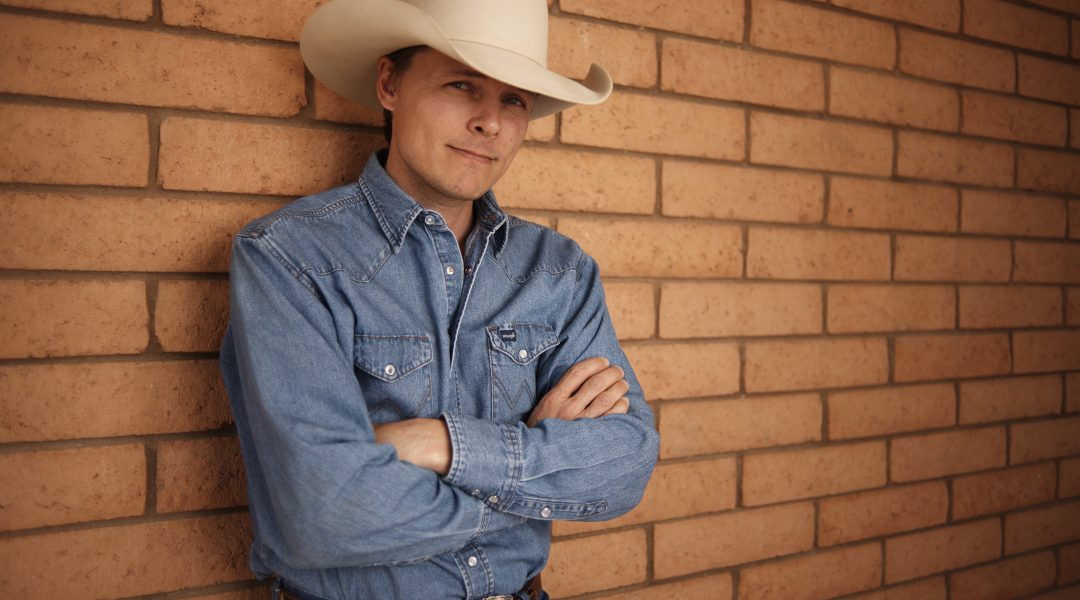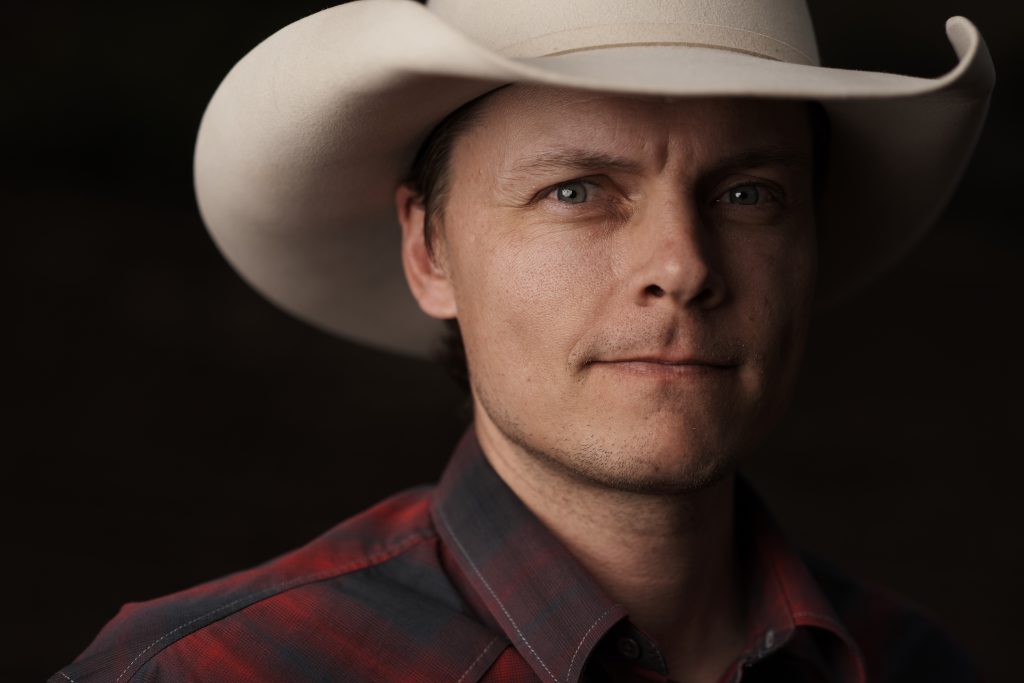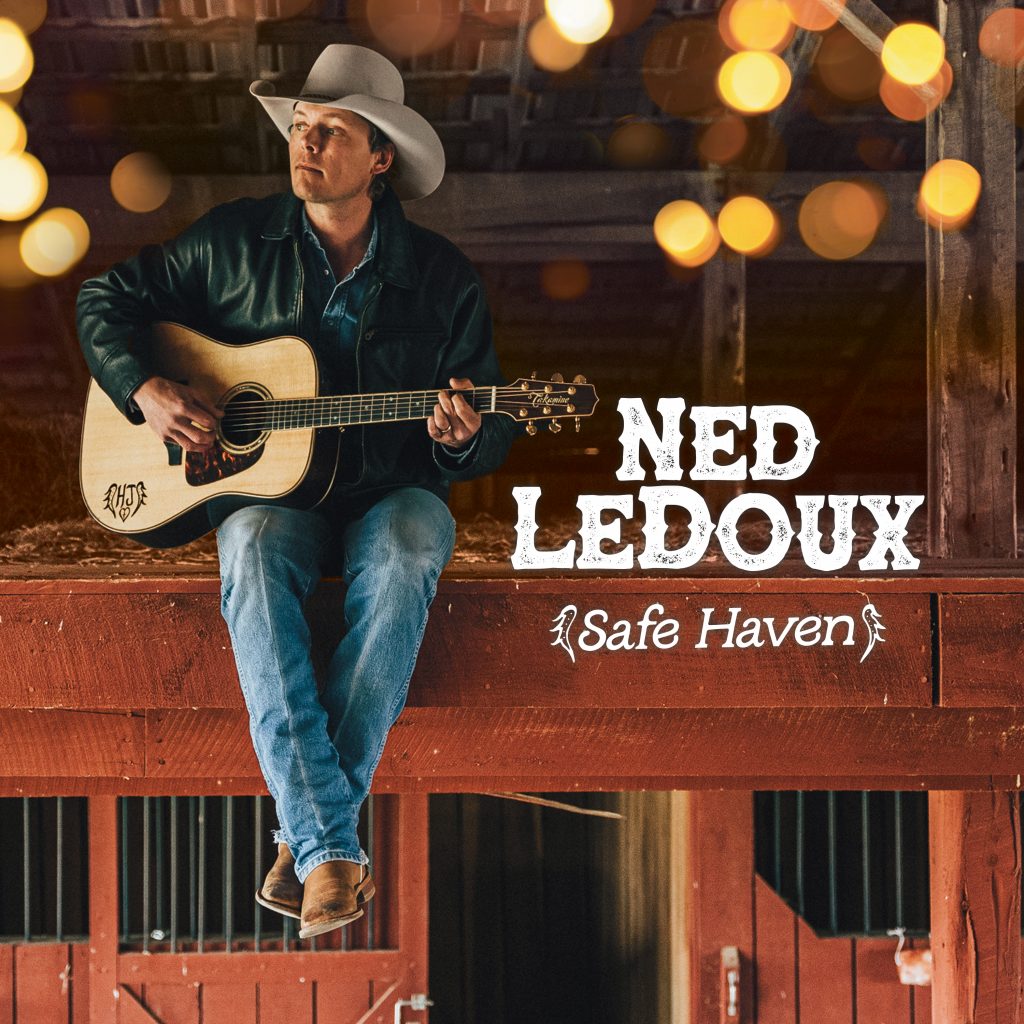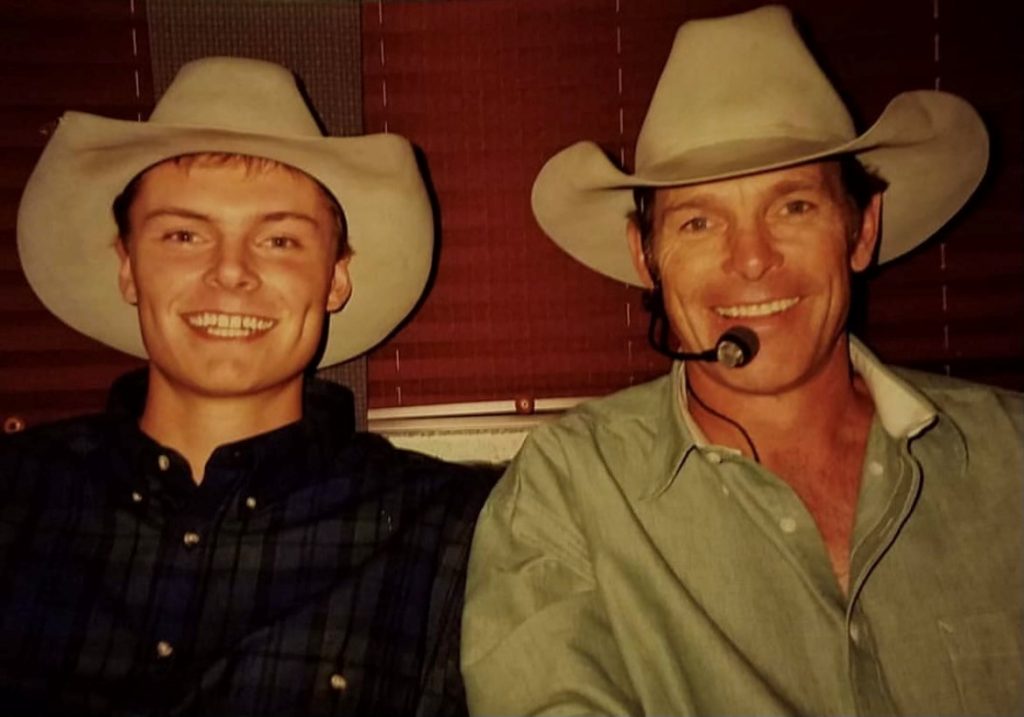Ned LeDoux’s new album, released April 4, has something for everyone, including a first-ever duet with his late father — rodeo and country music star Chris LeDoux — thanks to long-lost recordings.
Ned LeDoux, son of legendary rodeo champion and country singer Chris LeDoux, is keeping the spirit of cowboy music alive while forging his own path in the country music world. Ned has spent years honing his craft, first as a drummer and now as a singer-songwriter. In this interview with Cowboys & Indians, he opens up about his journey from playing drums in his father’s band to stepping into the spotlight as a performer and torchbearer of his family’s musical legacy. With his new album, Safe Haven, released in April, Ned discusses the inspiration behind his latest work, the process of writing and selecting songs, and how his ranching roots continue to shape his music.
Cowboys & Indians: You grew up in country music, and I'm sure you can remember the first time you played a guitar, the first time you really sang on stage. Was it always a dream to be a country music star, or did you kind of just fall into it?
Ned LeDoux: It didn’t happen overnight, but I’ll back up to when I was 5 years old. I got a drum set and I just fell in love with the drums — the look of them, the sound of them, the way it made me feel when I played them. And I took lessons for about a year and just learned the basic fundamentals of how to play, but then I just learned on my own. I went around the house, gathered up different cassette tapes, and it was almost like, once I could play along to some of my favorite songs, whether it was Charlie Daniels or Bruce Springsteen or whoever it was, I was like, “Man, I think this is what I’m going to do.” And so I went on to play drums for most of my life, probably at least over 30 years. And I played drums for my dad from 1998 until, I guess our last show with him was October of 2004.
But singing was never even a thought. All those years of playing drums, I just wanted to be the best drummer I could be. But I got into singing when Dad passed away. I joined up with a different band and they were based out of East River, South Dakota, and at a weekend gig somewhere, we all went back to the hotel Friday night and we’re just kind of hanging out. The lead singer, Dustin Evans, had his acoustic guitar out and was playing a few songs in this cheap motel room, and he got up to go get a beer or something and said, “Hey, here Ned.” He gives me the guitar and said, “Why don’t you play one of your dad’s songs?” And I just looked at Dustin and said, “Well, I'll hold this thing for you, but I don’t sing.”
But then he came back, and he sat down. He said, “Well, do you know this song or this song?” I said I knew the words to a lot of Dad’s songs. I just don’t sing. But I remember driving home that Sunday and just thinking how fun it would be just to learn a couple of songs on the guitar and sing to where if I’m sitting around a cheap motel with some buddies or a campfire and the guitar is being passed around, I don’t have to hand it off to the next guy. I can go ahead and grab a hold and sing something. So that’s really how the idea got started. And then I got home, and I went down my basement and picked out one of Dad’s old songs called “I’ve Got to Be a Rodeo Man.” It was the very first song I learned and took me the better part of the day to learn it. It just became a hobby, and pretty soon it got serious.
PHOTOGRAPHY: COURTESY JESSIE COLE GUTHRIE.
C&I: What was that first real onstage singing experience like?
LeDoux: The very first time I got in front of a crowd, I was with Dustin Evans, and we were in Manhattan, Kansas, for this big music festival called The Country Stampede, and we were playing the beer tent. The promoter came up to Dustin and he said, “Do you think you and Ned can get up on the main stage and just sing a couple of Chris’ songs?” Dustin comes running to the beer tent and said, “They're going to pay us $500 apiece if we get up and sing a couple of your dad’s songs.” I said, “Man, I know one song and it’s not very good.” And I thought I was off the hook. And I didn’t have a guitar. It wasn’t 30 seconds later, some dude said, “Here, I got one.” So, the first time I was ever on stage to sing in front of a crowd, there was probably close to 25 or 30,000 people out there. I was nervous for sure.
C&I: How important has having that background in playing drums been to the music you’re making?
LeDoux: Playing the drums for all those years I think has helped me with tempo and rhythm and dynamics. I remember when I took a hold of the reins and became the leader of the band. It was after our first or second show, and it might’ve just been a soundcheck, but I turned around and apologized to all the guys in the band. They're like, “What are you apologizing for?” I said, “Those damn drums are loud.”
C&I: You’ve headlined some shows, even the Chris LeDoux Days back home in Wyoming. Have you wanted to separate yourself from your dad’s legacy, or have you said, “You know, I’m going to use what he started and keep it going?”
LeDoux: I write a lot of songs about ranching and being a cowboy because that was the way I grew up. Dad was a world champion bareback rider, and he wrote lot of songs about rodeo. I’ve written a few songs about rodeo, but it’s not necessarily about me because I never did rodeo. So, I think just growing up on a ranch and in a musical family, I know enough about rodeo to write a rodeo song even though I didn’t rodeo. I’m proud to carry the torch, keep the LeDoux music out there.
PHOTOGRAPHY: COURTESY CHRIS LEDOUX FACEBOOK PAGE.
C&I: You brought up growing up ranching and living the Western lifestyle. Being out on tour and putting out music are a lot different than ranching. How did that early part of your life mold you into the singer-songwriter you are today?
LeDoux: I’m so thankful to have grown up on a ranch and done all the hard work that is involved with it. I was never really in charge of anything. They just told me what to do and showed me how to do it, and then eventually I could just go out on my own. You just learn a good work ethic. I was just a ranch kid, but at the time when you’re a kid, you dread having to go out in the cold and feed the cows or going around a fence. I don’t live on the ranch anymore, and as the years go by, I just look back and think, That was pretty fun. I’m so glad I got to do that. And it’s really helped me out later in life. But it definitely pours into the songs I write. There’s a song on my first album called “Forever a Cowboy,” and, just thinking about working with my granddad and my siblings, it reflects in the songwriting.
C&I: Modern life feels so far removed from the days of working outside with your hands and with animals. Do you have a sense of duty to show the world, “Hey, cowboys are still out there. We’re still doing the work.”
LeDoux: You hear it every now and then, “Cowboys are a dying breed,” but they’ve never left. Where I come from, they’re alive and well. I’ll play some cowboy poetry gatherings and stuff like that, and man, they show up. These guys are the real deal.
But I don’t really feel like it’s a sense of duty at all as far as what I’m writing. I’m just writing about what I know. It’d be cool to have a chart-topping song. I don’t know if my stuff will be ever mainstream. And I’m okay with that because there’s a lot of folks that live out in the country in the middle of nowhere that get it. And if the mainstream crowd takes a liking to it, then okay, cool.
C&I: When it comes to writing songs for the next album, are you hit by creative juices at some point? Or do sit down and say, “I got this song I really want to write and I'm going to figure it out until I do?”
LeDoux: I wouldn’t consider myself the songwriter’s songwriter at all. I don’t have a set schedule of Monday, Wednesday, and Friday at 2 o’clock, I’ve got to write. When I get out of the studio and get done with a new album, I usually put the pen and paper in a drawer for sometimes months at a time. It’ll be over three years since the last album when the next one comes out. It just takes me a while. But when I finally do get the inspiration and enough notes, I go into a songwriting mode and live like a hermit.
PHOTOGRAPHY: COURTESY IVPR.
C&I: Speaking of albums, Safe Haven is due out in April. Was there an impetus behind this album and how it came together?
LeDoux: On the first three albums I put out, I wrote the majority of the songs, whether it was eight of the 12 or nine of the 13 or whatever. But on this one, I only wrote half of them. And so through management and then my marketing distributing company, 30 Tigers, they sent me a lot of songs from outside writers. The first two or three songs that I picked out came from outside writers. Then I went through some old notes from my last album. It’s not like a concept album or anything like that, but whatever hits you and kind of feels good. One thing about all of my albums, it’s inevitable there’s going to be a song about traveling. So, I’ve got a song on there that I wrote called “Traveling Man.” I just like the variety, the mix of different stuff.
C&I: A little something for everybody?
LeDoux: I try to write a song that I know will be fun to play live. There’s a song on the new album called “Boys Growing Up.” We’ve been doing that one now for a little while, and the crowd seems to be enjoying it. I like variety, mixing it up, having something that’s upbeat, and I don’t want to put a bunch of ballads on an album and bring people down.
C&I: How different is it working on a song that you’ve written versus one that comes from an outside writer?
Ned: For me, it just takes forever. Sometimes if you fall onto a subject that you really know a lot about, it might come a little easier, but if you’re searching for a little more depth or a different direction, then you’re going to be going through all kinds of tunnels and irrigation ditches and things like that. But when it comes to picking out songs from outside writers, it’s fun. I listen to everything that people send me, but I’m kind of picky about what I’m going to use because it’s got to fit with what I’m doing. And it’s also got to sound like a song that I would’ve written myself, even though I didn’t. And these songs that are pitched to me have never been recorded. They’re demos for the most part. I’m pretty tickled with the ones that we picked out.
PHOTOGRAPHY: COURTESY IVPR.
C&I: One of your singles, “One Hand in the Rigging,” made waves because it has the final vocal tracks your dad had ever recorded. What was it like putting that together?
LeDoux: That’s the highlight on this album. And I’ll try to give you the short version of the story. Brenn Hill, who’s from Utah, was the songwriter, and he wrote this song over 20 years ago. He grew up a big fan of Dad’s. And at the time, Brenn was a kind of young, up-and-coming singer-songwriter. He wrote this song and asked Dad if he’d like to sing on it with him. Dad took a listen to it and was like, “Yeah, that’s a good rodeo song.” So for the last time, Dad went into a studio and sang this song, the last song he ever sang in a studio. For some unforeseen circumstance, Dad’s vocals never made the track.
So, it sat on a shelf for 20-something years. And I got to be friends with Brenn 15 years ago or so. We’d always catch up in Nevada during the Cowboy Poetry Gathering. And we got to talking about this song, and Brenn said, “I think the timing just wasn’t right. And you know how the Lord has a plan for everything. I think His plan for this is for it to be a duet with you and your dad.” And I said, “I think we’re in on the same page.” So, in a way, it was kind of like Brenn giving me the blessing to have this.
The only tricky thing was that when they recorded it, they recorded it on RADAR, which is a form of recording stuff back in those days. They just don’t make RADAR machines anymore. And Brenn said, “If we can find somebody who has one, then we can transfer it from here to a different kind of software. I got ahold of Mac (McAnally, his producer), and he said, “Yeah, I can get a hold of one.” And so they just transferred all that stuff to the more updated way of recording.
The first time I heard it was the final mix. I was in the studio and laid down my vocal track, and then we had to hit the road, and then Mac sends me the final mix of “One Hand in the Rigging.” And I couldn’t wait to get in the truck so I could listen to it through some good speakers. Just to hear me and my dad singing together, it was pretty special.
Find Ned LeDoux's latest albums, tour dates, and more at nedledoux.com.
PHOTOGRAPHY: COURTESY JESSIE COLE GUTHRIE.


















